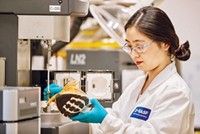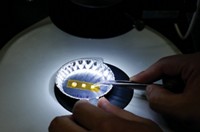Advertisement
Grab your lab coat. Let's get started
Welcome!
Welcome!
Create an account below to get 6 C&EN articles per month, receive newsletters and more - all free.
It seems this is your first time logging in online. Please enter the following information to continue.
As an ACS member you automatically get access to this site. All we need is few more details to create your reading experience.
Not you? Sign in with a different account.
Not you? Sign in with a different account.
ERROR 1
ERROR 1
ERROR 2
ERROR 2
ERROR 2
ERROR 2
ERROR 2
Password and Confirm password must match.
If you have an ACS member number, please enter it here so we can link this account to your membership. (optional)
ERROR 2
ACS values your privacy. By submitting your information, you are gaining access to C&EN and subscribing to our weekly newsletter. We use the information you provide to make your reading experience better, and we will never sell your data to third party members.
Materials
An American Enterprise
Concerns stay local at the big North American plants of Germany's Degussa
by Michael McCoy
May 21, 2007
| A version of this story appeared in
Volume 85, Issue 21

CHANGE MUST SEEM relentless at the Düsseldorf headquarters of the German specialty chemical maker Degussa. The company is working to find its place in RAG, the conglomerate that bought it last year from energy company E.ON. Plans are in the works to rebrand both Degussa and RAG. Meanwhile, German chemical maker Lanxess is pressuring RAG to drop its plans for a stock offering and sell it Degussa instead (C&EN, May 14, page 13).
Change comes more slowly at the Degussa facility in Greensboro, N.C. The plant's 300-plus employees often still say they work for Stockhausen, the family-owned German company that built the site in 1978. Michael McCoy, a storeroom manager who shares a name with this reporter, comes to work each day as he has for more than 15 years.
Indeed, while corporate restructuring is top-of-mind at headquarters, concerns on the plant level are more prosaic, C&EN finds during a recent trip to Greensboro and Mobile, Ala., homes to Degussa's two largest U.S. facilities. Managers are focused on environmental compliance, community relations, and keeping their sites relevant in a country that is losing its manufacturing infrastructure day-by-day.
Stockhausen came to Greensboro in the 1970s to make chemicals for the Southeast's then-vibrant textile industry. Next came production of industrial hand cleaners that are still made and sold under the Stoko name. By the 1980s, however, Stockhausen had found its real growth engine: superabsorbent polymers (SAPs), acrylic acid-based materials that can absorb up to 300 times their weight in water.
Although SAPs are mainly polyacrylic acid, they are not simple polymers. Scott Smith, head of superabsorbents R&D at the Greensboro site, explains that a straightforward polymerization of acrylic acid would yield a linear molecule that bristles with water-loving carboxyl groups and readily dissolves in water. But add other reactive monomers and cross-linking occurs, yielding a tightly wound polymer that soaks up water instead. Moreover, unlike paper or sponges, SAPs pull water into their molecular structure and don't let it back out.
SAPs revolutionized the disposable diaper business. The paper-fluff-filled disposable diapers of the 1980s were bulky and not much more absorbent than their cloth forebears. By 1990, each disposable diaper contained about 4 g of the salt-crystal-like SAP granules and was sleek and highly absorbent.
Stockhausen rode the diaper boom through a period of growth and corporate change. In 1996, it was acquired by the German company Hüls, and in 2001, Hüls was acquired by Degussa. Last year, Degussa folded in Dow Chemical's SAP business. That acquisition cemented Degussa's role as the global SAP leader with what Bernfried A. Messner, vice president of sales and marketing for Degussa Superabsorber, says is a 27% share of the 1.2 million-ton-per-year market. Japan's Nippon Shokubai is in second place, and BASF is third.
Messner is aware that Degussa soon will be at a cost disadvantage to BASF, the number two U.S. player. BASF is closing its SAP plants in Aberdeen, Miss., and Portsmouth, Va., and moving production adjacent to its Freeport, Texas, acrylic acid plant. Degussa, on the other hand, must ship acrylic acid by rail from Deer Park, Texas, where it runs a joint venture with Rohm and Haas, to SAP plants in Greensboro and Garyville, La.
According to Smith, though, the company's real strength is its research and technical prowess, honed at R&D labs in Greensboro and Krefeld, Germany, and at technical centers in Turkey and China. He says the company has more than 1,000 patents in the SAP field and tests hundreds of new products every year.

THE CENTERPIECE of the Greensboro lab is a bank of real-looking rubber baby torsos that are set up to release a urinelike liquid in the manner of a boy or a girl. Researchers at the lab take apart and analyze more than 15,000 diapers a year in their quest to understand the market and help diaper makers develop new models.
"Innovations in SAPs have driven each new diaper generation," Smith claims. He explains that marketers of the first SAP-containing diapers sought to maximize the polymers' amazing absorbent properties. For the second generation, they focused on maintaining dryness and diaper integrity under the weight of the baby's body.
Today's diapers encourage liquid to spread throughout the SAP-fluff matrix rather than accumulate in an ungainly lump. This quality is achieved through good diaper design and judicious use of SAP cross-linkers such as triacrylates and triallyl amines. The most advanced SAPs are post-cross-linked on their surface, Smith says. The result is a polymer crystal with a highly cross-linked skin for strength and a lightly cross-linked core for absorbency.
The two giants of the diaper world are Procter & Gamble, with its Pampers brand, and Kimberly-Clark, maker of Huggies. Messner claims that Degussa is the only SAP provider to have significant business with both firms. It also supplies private-label diaper companies such as Tyco International.
Although concentrated in just a few corporate hands, the diaper business is cutthroat. To maintain the confidentiality of customer-specific research projects, all work for Kimberly-Clark takes place in the Greensboro lab, while P&G projects are carried out in Krefeld. "We live and die on our customers' trust that no R&D will cross over," Messner says. "Our firewall is the Atlantic Ocean."
Peter Gursky, vice president of operations at Greensboro, notes that Degussa's SAP operation there is unique among large chemical companies in that it is home to people in R&D, manufacturing, and marketing. Being in one location, he points out, allows them to confer easily and quickly adapt to market changes and customer requests.
As site manager, Gursky has a vested interest in promoting Greensboro as a good place to do business. He has seen area companies in textiles, furniture, and tobacco shrink or close their doors and doesn't want Degussa to go the same way.
His track record has been good so far. In 2003, the Degussa affiliate Röhm picked the site as a repackaging location for methacrylic acid. SKW, part of Hüls, later chose Greensboro to build a plant that makes a concrete plasticizing agent. And after its purchase of the Dow SAP business, Degussa turned to Greensboro for a "very substantial" expansion, Messner says.
In Mobile, site manager Thomas Bates is similarly preoccupied. The 30-year-old facility there is Degussa's largest in North America, employing about 700 people and manufacturing dozens of products, including the feed additive methionine, the bleaching product hydrogen peroxide, and the filling and abrasive agent fumed silica.
At its peak, the Mobile site boasted more than 1,200 employees, but that was before the 2002 closure of a polyacetal plant and a series of operational streamlining measures. Six years ago, for example, each manager had a secretary who would take letters, print e-mails, and help compile a thick monthly report that went to Düsseldorf. Operations were "very German," Bates says. Today, a secretary supports four or five managers, and the monthly report has been abandoned.
Bates says a big part of his job is promoting the Mobile site as a potential manufacturing location for Degussa's 12 business units and even outside companies.
A Degussa plant making alkoxide catalysts for biodiesel production is slated to be built there. Bates is working to convince Degussa's high-performance polymers unit to choose the site for its first North American plant making Rohacell polymethacrylimide foam. He would also like to see Degussa enter the business of making polysilicon for the photovoltaics industry by building a plant in cooperation with nearby Mitsubishi Polysilicon, which supplies the material to the semiconductor industry.
In addition to their business recruitment efforts, Gursky and Bates work with their surrounding communities, meeting with local officials, serving on the boards of community organizations, and overseeing charitable efforts. Around the Greensboro plant, Gursky points out, the community is primarily working class, and people are interested in economic growth. "They don't view us as the big, bad neighbor," he says.
ALTHOUGH MUCH of their focus is local, the site managers say they appreciate their place in a global enterprise that can direct talented executives their way. One example is Bobby Mitra, a Degussa chemical engineer with years of engineering and business development experience in the U.K. He just moved to Greensboro to run Creasorb, a business charged with developing nonhygiene uses for SAPs, such as fire-fighting gels and soil moisture retention products.
In Mobile, a walk down the hall of the main building reveals a mix of German and American names on the doors: Brian Wilson, Wolfgang Riegels, Mike Dendy, and Heiner Rieck. In all, roughly 35 German nationals work at the site, Bates says.
On a plant tour, Reigels, a technical director, explains that he grew up and trained in Germany but has worked in Mobile for 16 years. He likes his life in America and plans to retire here. Although Riegels is, perhaps, not typical of Mobile employees, his longevity is: Bates says the average staffer at the plant has almost 15 years of service.
Because he travels to Germany about eight times a year, Bates knows about the corporate uneasiness that can pervade headquarters, but he says it's just not on the radar in Mobile. "Whether Degussa is owned by E.ON, RAG, or someone else, no one is losing any sleep over here," he says. "If you are taking care of your business and making money, it won't matter whom you work for."




Join the conversation
Contact the reporter
Submit a Letter to the Editor for publication
Engage with us on Twitter